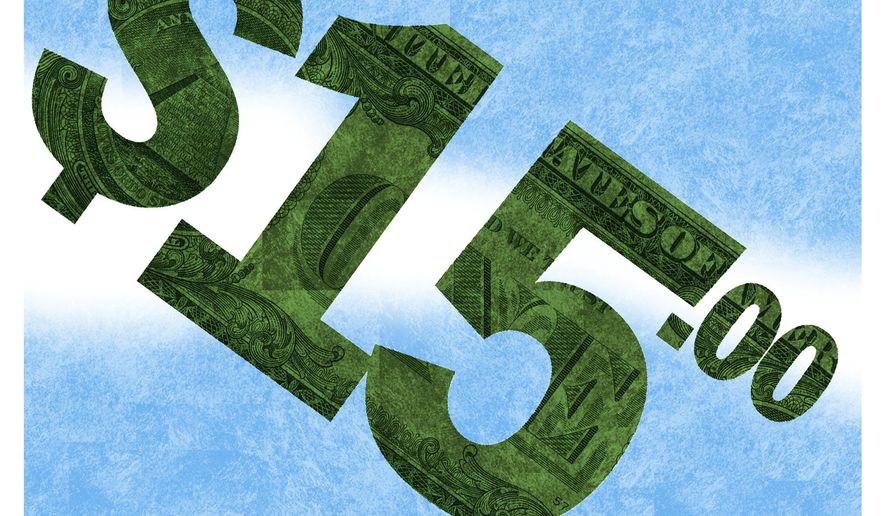OPINION:
President Biden wants to raise the minimum wage to at least $15 an hour, but this is hardly the best way to lessen income inequality.
Poverty in America and conditions for the working poor are not nearly as extreme as progressives advertise. Measures of inequality — such as those in Census reports — often focus on earned income and pensions but fail to consider progressive taxation, welfare benefits and other private transfers.
For 2017, former Sen. Phil Gramm and former Bureau of Labor Statistics Assistant Commissioner John Early estimated the impact of government programs such as food stamps, Medicaid and rent subsidies and contributions from private charities. Those raised average household income for the bottom quintile from about $4,908 to $45,389 — nearly double the poverty line for a family of four.
That’s why the working poor own cell phones with family subscriptions that cost a substantial portion of their earned income. Whereas growing up in working-class community on Long Island in the 1950s, I frequently observed poorer mothers using the pay phone at the corner grocery because they could not afford a landline.
In 1938, Congress established the federal minimum wage and has periodically raised it to accommodate inflation. In 2009, it was set at $7.25 per hour—or about 33 percent of wages paid hourly workers as computed by BLS.
Conservative economists don’t like governments fixing prices above what market forces would require, because it wastes resources — too much milk from dairy price supports and unemployment for the minimum wage. But for low wage workers, the damage is already done — gradually raising the minimum wage in line with other wages would likely cause minimal new job losses.
Among voters the idea gaining traction is that it is better to assist the working poor by offering higher paying employment opportunities than through enhanced government benefits financed with increased taxes on more affluent Americans. Conservative leaning Florida recently approved a $15 minimum wage, and 30 states have enacted higher minimum wages than the federal standard.
In places like San Francisco and Seattle economic studies documented that abruptly raising the minimum wage caused significant restaurant closures and job losses. And dramatic shifts disturb wage patterns for workers further up the wage ladder — for example, it’s tough to raise the pay of a counter clerk at McDonald’s $2 an hour without also raising the pay of the shift manager too.
In low wages markets, raising McDonald’s starting pay for servers to $15 an hour would increase labor costs about $8 — including add-ons for payroll taxes and unemployment insurance—and increase the cost of a quarter-pound hamburger meal from about $6 to $8.
Take out restaurants, drug stores and groceries in cities where minimum wages have been set high are increasingly relying on computer-assisted check out to save on labor costs and avoid raising prices enough to drive away too many customers.
Overall, higher wages favor e-commerce over brick-and-mortar, because fulfillment centers more readily lend to automation. And those favor large businesses—at the expense of smaller and stand-alone consumer goods manufacturers, retailers, restaurants, hotels and entertainment venues—because they can spread development costs for robotic solutions, software and websites over higher volumes and more outlets.
For workers near the bottom of the income scale, raising the minimum wage to $15 an hour would boost household incomes, even after they pay a lot more for a Big Mac and a little more for UPS delivery on online purchases, but it would lower real incomes among households further up the income scale.
While progressives might hail this as economic justice, the Congressional Budget Office in a 2019 study found the losses up the income ladder would be greater than the gains for the working poor. Overall, a $15 minimum wage would cut family incomes by about $9 billion, and some 1.3 million low wage workers would lose their jobs and suffer tragic losses of independence, dignity and income altogether.
It’s simply less harmful to all families to raise the earned income tax credit but increasing taxes on middle and upper income Americans for such purposes is problematic with slim majorities of Democrats and moderate Republicans in Congress.
With robots and artificial intelligence becoming ubiquitous no matter what we do, raising the minimum wage over several years to $12 a hour or about 40 percent of the average hourly wage — and then adjusting it annually to kept it aligned with that benchmark — would have fewer adverse consequences and be a reasonable compromise that hues to the empathy of voters for the working poor.
• Peter Morici, @pmorici1, is an economist and emeritus business professor at the University of Maryland, and a national columnist.




Please read our comment policy before commenting.